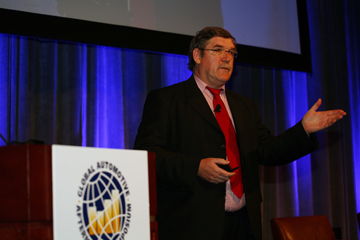By Arianne Anderson Managing Editor, Counterman
It’s no surprise that the battle for service and repair business between dealerships and the aftermarket across the U.S. and Canada seems never-ending. Dennis DesRosiers, founder and president, DesRosiers Automotive Consultants, has conducted extensive research on this battle and at the 2007 Global Automotive Aftermarket Symposium today in Chicago , he offered insights as to who is winning and how this fight may take shape in the future.
According to DesRosiers, dealerships have been in a powerful position for a long time. They have invested heavily in their shops, the power of their OEMs have backstopped their every move, they have helpful tools such as extended warranties, they have advanced CRM software to help customers and they have vehicles that are becoming radically complex, especially in light of the ‘greening’ industry. 
DesRosiers said, “The import nameplate car dealer is cut from a different cloth than the traditional GM, Ford and DCX competitor. Many import nameplates come from a service background, they invented customer satisfaction, they sell products that consumers have a very positive ownership experience with and they have consistently updated their product and technology.”
By doing these things, the import nameplate has not allowed the traditional aftermarket to catch up. According to DesRosiers, the traditional aftermarket has held ground well over the last decade but still has lost three to five points of share. How long will this continue? And, why is the aftermarket in this position?
DesRosiers offered some answers to these questions: “Image is still an issue, as well as training. Management ability is an even bigger issue and succession is a concern too. Independent shops are knowledgeable from a technical perspective, but have trouble translating this knowledge to their customers. Generally technicians have poor business skills, poor customer follow-up, they are not aggressive and English is often a second language.”
There are four “windows” included in the automotive market, said DesRosiers. There are new vehicles, automotive finance, aftermarket and used vehicles. “Dealerships are in the most critical positions in all four of these windows or value-chains. They are the only player in all four chains,” DesRosiers said.
Dealers invest heavily in image stores and just about the only way they can re-coup these investments is through fixed operations. “They are the only group that is increasingly ‘getting-it’ in terms of understanding the importance of quality," DesRosiers said. “They have invested trillions of dollars into improving quality and increased quality and longer lasting vehicles forces more attention to be put on the entire value chain of the vehicle.”
So, who wins the service and repair battle when it comes to OEs and the aftermarket?
Well, DesRosiers says, “Just ask the customer.”
The customer looks for the following things when shopping for service:
* work done right the first time * trust * the relationship with the technician * fair price * work done on time * guaranteesDealers do well in the above categories, but they struggle when it comes to “soft variables” such as ‘people issues’ and ‘feel good’ issues. The customer wants more than anything to feel good about their experience and feel like their opinions and concerns matter.
According to DesRosiers, the aftermarket knows the importance of and practices these soft variables, which prove to be most important.
“If the car dealer ever learns the soft variables, the independent aftermarket would be in real trouble,” DesRosiers concluded.










